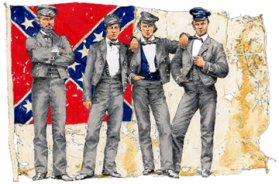I’m usually not one to be too picky about labels — depending on the dialectical context and the aspect of my politics that I want to emphasize at the moment, they can accurately be described as Leftist
, a libertarian
, free marketeer
, socialist
, anarchist
, democratic
, republican
, individualist
, mutualist
, populist
, radical
, feminist
, et cetera. But there is one thing that I just refuse to call myself anymore. I am not a Progressive
, God damn it, and no matter how much I may like some individual people who call themselves that, and no matter how much I may sympathize with a broad cluster of their personal concerns and subcultural values, I just will not call myself one for love or money.
Why not? Well, there are some specific historical reasons having to do with what the folks calling themselves Progressives
in the early 20th century actually were like and what they actually did. But there are also some contemporary reasons, too. Look at the prominent political figures and organizations calling themselves Progressive
, and the kind of politics that they endorse when they have their Progressive
hats on. You are now looking at a bunch of losers. Sometimes they’re noble losers, and sometimes they are silly milksop losers, but losers they remain, and you may as well go around calling yourself pudd’nhead
for all the grace and dignity that the mantle of Progressivism
confers.
An example: here is the latest series of e-mails I’ve received from MoveOn. Quick! Everybody wring your hands!
From: Noah T. Winer, MoveOn.org
To: Charles Johnson
Date: Tue., 14 Jun 2005
…
A House panel has voted to eliminate all public funding for NPR
and PBS, starting with Sesame Street,
Reading
Rainbow,
and other commercial-free children’s shows. If
approved, this would be the most severe cut in the history of
public broadcasting, threatening to pull the plug on Big Bird,
Cookie Monster and Oscar the Grouch.
Sign the petition telling Congress to save NPR and
PBS:
…
If we can reach 250,000 signatures by the end of the week, we’ll
put Congress on notice. After you sign the petition, please pass
this message along to any friends, neighbors or co-workers who
count on NPR and PBS.
And:
From: Noah T. Winer, MoveOn.org
To: Charles Johnson
Date: Wed., 15 Jun 2005
In less than a day, we’ve blown past our goal–more than 300,000 of
us have signed the petition to save NPR and PBS from losing public
funding. This is huge, but we need your help.
Tomorrow, the House Appropriations Committee will decide whether to
approve these severe cuts to NPR and PBS. We can stop the cuts–and
save public TV and radio–with a strong show of public outrage.
We’ll report to the committee members on our petition before they
vote.
Can you help us reach 400,000 signers by the end of the day?
And then, when the effort to stop the committee vote failed:
From: Noah T. Winer, MoveOn.org
To: Charles Johnson
Date: Wed., 17 Jun 2005
Yesterday, a House committee slashed half of the federal funding
for NPR and PBS, specifically targeting popular children’s shows
like Sesame Street
and Postcards from Buster.
These
cuts will decimate local stations and undermine quality news
reporting. This is nothing less than an effort to kill off NPR and
PBS.
But people like you are fighting back, making the petition to save
NPR and PBS one of the most popular we’ve ever seen–750,000
signers to date! Already, the public outcry has delayed the effort
to eliminate funding entirely, but we must fight to restore full
funding at once. The House will vote on these massive cuts to NPR
and PBS as soon as Tuesday, and representatives are making up their
minds right now.
Make sure Rep. Dingell doesn’t take away the programs you love.
Call him today at:
Congressman John Dingell
Phone: 202-225-4071
And then:
From: Noah T. Winer, MoveOn.org
To: Charles Johnson
Date: Wed., 20 Jun 2005
In the next few days, the House of Representatives will vote on
whether to slash funding for NPR and PBS. And tomorrow, before
Congress votes, we’ll present stacks and stacks of printed
petitions and public comments to save public broadcasting. We’ll be
joined by members of Congress and the public TV and radio staff
fighting for survival.
Over 817,000 people have signed the petition so far–simply
incredible. But we want to present 1 million signatures to the
press tomorrow, and we can do it with your help. In all our years
of online organizing, we’ve never heard of one million Americans
signing a petition in a week, but we’re within striking distance
now.
Help us reach 1 million signers by the end of the day. Sign the
petition at: …
The stakes are high: some of the best programs on the air are at
risk. After you sign, please send this message on to your friends
and colleagues–it’ll take all of us pushing together to get to the
1 million mark.
…
If the House passes these massive cuts, we’ll fight to restore the
funding when the Senate takes up public broadcasting. But even if
we stop the House cuts, we’ll need to make sure Senate Republicans
don’t try the same thing.
Together, we can stop the House from slashing NPR and PBS in the
federal budget. Can you help us hit 1 million signers today?
MoveOn’s online petition campaign had exceeded their goal of one million petitioners. In fact, they’d reached 1,091,509 last I looked.
And, the last I heard, they managed to get the programming funding restored, but the House voted for another $105 million of government funding to be eliminated from the Corporation for Public Broadcasting’s budget anyway:
After a storm of protest from supporters of public television and
radio, the House voted overwhelmingly Thursday to restore $100
million in programming money to next year’s Corporation for Public
Broadcasting budget. The CPB is the private agency that disburses
funds to the Public Broadcasting System, National Public Radio and
their member stations.
At the same, however, $105 million in funding, including $23
million for children’s programming and educational outreach, was
eliminated. The fight over that money will now move to the Senate,
which has traditionally been a strong backer of PBS and NPR.
San Jose Mercury-News 2005-06-24: House restores public TV funding, but fight continues

Above: Mister Buckles saves public broadcasting.
If you want to know why Progressives
keep losing all the time, then here it is:
If we can reach 250,000 signatures by the end of the week, we’ll
put Congress on notice. …
We can stop the cuts–and save public TV and
radio–with a strong show of public outrage. …
But people like you are fighting back, making the
petition to save NPR and PBS one of the most popular we’ve
ever seen …
Make sure Rep. Dingell doesn’t take away the programs you love.
Call him today …
And tomorrow, before Congress votes, we’ll present
stacks and stacks of printed petitions and public comments to
save public broadcasting. …
What this has accomplished, so far, is that it’s sent 1,091,509 copies of the following e-mail to members of Congress:
TO: Your senators and representative
FROM: (Your Name and Email)
SUBJECT: Save NPR and PBS
Dear senators and representative,
(Your personal note)
Congress must save NPR, PBS and local public stations. We trust
them for in-depth news and educational children’s programming. It’s
money well spent.
Don’t get me wrong. I like PBS and NPR is just about all the radio I ever listen to. The issue here isn’t whether they should face a funding crisis or not; I hope that they don’t. Rather, it’s what you should do in the face of that funding crisis. MoveOn just invested an incredible amount of time, money, and energy into mobilizing a bunch of Progressives to whine about it in Congress and beg for the money back. Meanwhile, instead of signing an online petition, calling my Representative, and e-mailing my friends and colleagues to get them to shake the change cup with me, I shut up and put down a pledge of $10 / month to Detroit Public Television.
Now, if 1,091,509 people in MoveOn’s orbit had done what I did, instead of what they did, then by my calculations PBS and NPR would have $130,981,080 more money for programming in the upcoming year. More importantly, they’d have that $131 million no matter what Congress and the Senate decided to do.
You might claim that not everyone who gets MoveOn e-mails will put down a pledge, but a lot more people will put down a zero-cost signature. You might think that MoveOn just can’t command that kind of money. Well, that strikes me as making excuses: we are talking about the group that just threw tens or hundreds of millions of dollars (depending on the as-yet unreleased budget data for their 501(c)(4) branch) down the tubes for electable
John Kerry just last year. But fundraising is tricky, and maybe they wouldn’t make as much as they might hope. But think it about it this way: when you give money directly to people doing good work, the economics of failing to meet your goals are different. Lobbying is, more or less, an all-or-nothing game, with very few chances for gains on the margin. Names on a petition may or may not make a difference; but if they don’t make a difference (and, frankly, it doesn’t look like they made much of one here) then the names and pious hopes that NPR and PBS got out of the campaign aren’t worth the electrons that they’re printed on. But if you don’t hit your targets in direct support, the contributions you did get are money in the bank, no matter what. If only half as many people pledged as signed the petition, well, then PBS and NPR would have $65,490,540 that they didn’t have before. If the average contribution was $30 instead of a $10 / month pledge, they’d would have $32,745,270. Maybe that will save Big Bird and maybe it won’t; but even if it doesn’t it’s a darn sight better and more secure than the nothing that failed petitioning campaigns produce.
There’s a general principles here worth mentioning; it’s a principle the Left used to care about. It’s called direct action, and the longer the Progressive
wing of the Left keeps ignoring it — the longer that they spend throwing time and organizing effort down the tubes to beg the government to support the institutions that they like — the longer we are all going to be losers.
We can do this ourselves, so quit begging. Shut up and put up.


